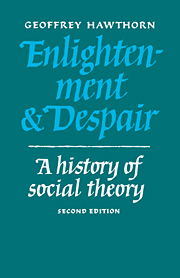Book contents
- Frontmatter
- Contents
- Preface
- Introduction
- 1 Enlightenment and doubt
- 2 History resolved by mind
- 3 History resolved by men
- 4 History resolved by laws I
- 5 History resolved by laws II
- 6 History resolved by laws III
- 7 History resolved by will
- 8 History doubted
- 9 History ignored
- 10 History unresolved
- Conclusion
- Bibliographies
- Index
1 - Enlightenment and doubt
Published online by Cambridge University Press: 18 September 2009
- Frontmatter
- Contents
- Preface
- Introduction
- 1 Enlightenment and doubt
- 2 History resolved by mind
- 3 History resolved by men
- 4 History resolved by laws I
- 5 History resolved by laws II
- 6 History resolved by laws III
- 7 History resolved by will
- 8 History doubted
- 9 History ignored
- 10 History unresolved
- Conclusion
- Bibliographies
- Index
Summary
in medieval european thought, the epistemological authority was the word of God as revealed through the teachings of the Roman Church. There was in this period, it is true, a recognised distinction between natural and divine law, but although the first was held to be distinct from the second and accessible to reason, it was not generally considered to be independent of it. Divine law alone was considered capable of restoring to man that true knowledge lost in his Fall. Reason, therefore, could do more than lead towards, prepare the ground for, revelation.
The Renaissance modification of this epistemology was a radical one, but the radicalism was still one to which the Church could at least in principle accommodate itself, adapting yet maintaining its authority. In medieval thought nature was seen as the creation of God, a realm that was in part intelligible through the use of reason but only in part so intelligible, since a complete understanding of it entailed an understanding of God's purpose in having created it, and that was accessible only to revelation. But towards the Renaissance it came to be asserted, as Bruno put it, that ‘it is more worthy for [God] to be the internal principle of motion, which is his own nature, his own appearance, his own soul than that as many entities as live in his bosom should have motion’.
- Type
- Chapter
- Information
- Enlightenment and DespairA History of Social Theory, pp. 8 - 27Publisher: Cambridge University PressPrint publication year: 1987

